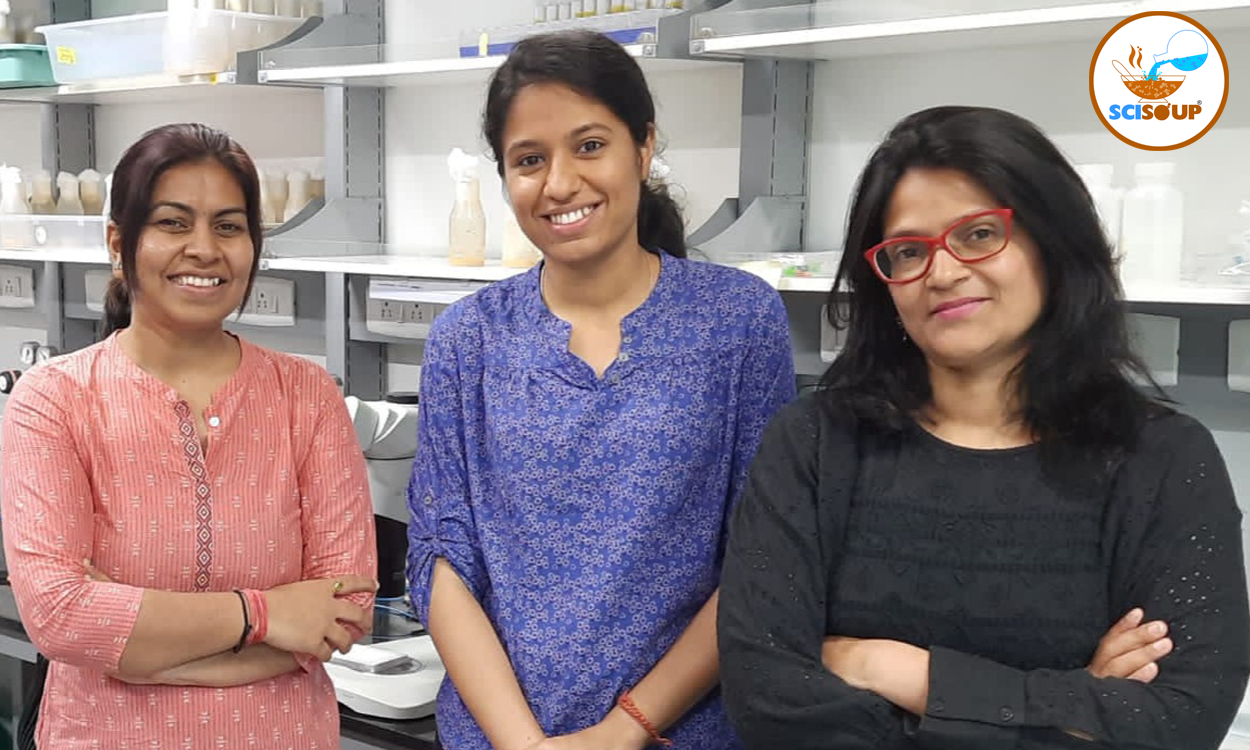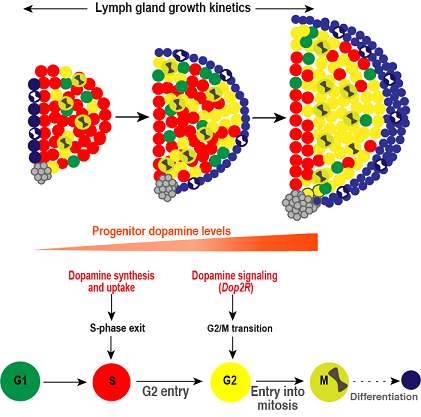
New study demonstrates that the blood-progenitor cells of the hematopoietic tissue of Drosophila (fruit fly), upregulate intracellular dopamine levels to control their proliferation and cell cycle transitions for appropriate tissue growth..
MAY 26, 2022 | BY RATNESHWAR THAKUR
Neurotransmitters, the messenger molecules of the brain, are commonly known for their roles in the brain functions especially in motor coordination, cognition and behaviour control. However, recent studies suggests that neurotransmitters have other possible roles outside this niche. For example, neurotransmitter GABA can perform communication between the brain and the blood and this helps the blood-progenitor cells to maintain their precursor state. Here blood progenitor cells are an intermediate stage involved in the formation of mature blood cells.
Motivated by these clues, Dr. Tina Mukherjee’s team at Institute for Stem Cell Science and Regenerative Medicine (inStem), Bangalore, India have been trying to gain more understanding about the roles of Neurotransmitters in the proliferative capacity of blood progenitor cells and its connection with lymph gland growth and immunity.
The results, published in the journal “EMBO reports,’ demonstrates that the blood-progenitor cells of the hematopoietic tissue of Drosophila (fruit fly), upregulate intracellular dopamine levels to control their proliferation and cell cycle transitions for appropriate tissue growth.
According to this study, the blood-progenitor cells are self-sustaining in terms of synthesising and sensing a neurotransmitter, dopamine, which is classically known to be a sleep and mood regulator in animals including humans. The blood-progenitor cells show a build-up of intracellular dopamine with time and this is necessary to sustain the proliferation of these progenitor cells.
In this study, Mukherjee’s team tested impact of blocking the synthesis and sensing of dopamine by the blood-progenitor cells, and they found, it resulted in a small lymph gland size (the hematopoietic organ of Drosophila), showcasing that dopamine acts as a pro-growth cue.
 First author Ankita Kapoor explains, there is time-dependent requirement of the different dopamine modules on the cell cycle phasing of the progenitor cells. The dopamine synthesis and uptake in the progenitors is important for an early S to G2 phase cell cycle transition. Later on, the dopamine signalling, by receptor Dop2R, becomes key to drive a G2 to M phase transition.
First author Ankita Kapoor explains, there is time-dependent requirement of the different dopamine modules on the cell cycle phasing of the progenitor cells. The dopamine synthesis and uptake in the progenitors is important for an early S to G2 phase cell cycle transition. Later on, the dopamine signalling, by receptor Dop2R, becomes key to drive a G2 to M phase transition.
The significance of this work lies in highlighting how multi-faceted neurotransmitter molecules are, apart from their well characterised roles in the nervous system. They can be employed by the immune system of an organism, in this case of fruit flies, for fundamental yet important processes like cell cycle phase regulation and growth.
Mukherjee’s team believes that blood-progenitor cells are actively making dopamine, a molecule that is already prevalent in the brain and skin (cuticle) of the fruit fly. This explains that the blood system is able to independently calibrate its internal levels of dopamine so as to control cell division of the blood-progenitor population. Mukherjee says, Additionally, this highlights the requirement and function of intracellular dopamine, which begs our attention to treat such molecules as metabolites also.
The findings presented here by inStem researchers will be applicable to scientists interested in understanding blood development and probing mechanisms that are important for blood progenitor proliferation and function.
The research team included Ankita Kapoor, Achalla Padmavathi, Sukanya Madhwal and Tina Mukherjee from Institute for Stem Cell Science and Regenerative Medicine (inStem), Bangalore, India and Manipal Academy of Higher Education, Manipal, India.
The study was supported by Department of Biotechnology (DBT)-Center of Excellence grant, Department of Science and Technology (DST), India-Early Career Research award, Department of Biotechnology (DBT)-Innovative Young Biotechnologist Award (IYBA) 2017, Department of Biotechnology (DBT)-Ramalingaswami Re-entry Fellowship and Indo-French Centre for the Promotion of Advanced Research (IFCPAR/CEFIPRA) grant to Tina Mukherjee.
Journal Reference:
Dual control of dopamine in Drosophila myeloid-like progenitor cell proliferation and regulation of lymph gland growth
Olfactory control of blood progenitor maintenance
Disclaimer:
To ensure accuracy and scientific relevance, this science blog has been run past the researchers.
